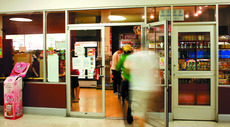Going in to the C-Store for a quick bite to eat seems to be the easiest place to turn to when you need a snack in between classes. But it can be costly, especially if you’re like Rebecca Reese, mass communication junior, who describes herself as “an avid buyer.”
Reese lives off-campus near Calhoun Street. She said she stops at the C-Store almost every day for drinks or a quick snack, especially when she doesn’t have time to go home.Though the C-Store is located in the heart of campus, many students complain about the dent it puts in their wallets. “The prices are simply outrageous,” said Scott Gilliland, psychology sophomore. Gilliland lives in Biever Hall and said he orders takeout when he can but relies on the C-Store for most of his meals. “I had $900 at the start of the semester and I’ve already run out once, and I’m about to run out again,” he said
Gilliard said he believes the C-store takes advantage of student’s need for convenience.
Vance Howe, director of Dining Services, for the past four years understands students are concerned but explained the pricing is not a scam, saying the C-Store makes about a 3 percent profit.
“I don’t think a 3 percent profit is unreasonable in a university environment; we are a for-profit company working in a non-profit environment,” Howe said. Howe explained “we don’t get volume pricing like a grocery store would because grocery stores turn items over on a weekday basis.”
Though distributors have pressured Howe to raise prices recently, he said Dining Services has worked to keep prices steady. “We haven’t raised our prices in two years.”
The C-Store is a franchise that pays the university for the space they occupy; Howe said, “With pricing, we add in for commission back to the university.” Howe also said a number of vendors like Coca Cola, Starbucks and Godfather’s Pizza set the suggested retail pricing.
Howe explained the store is trying to revamp its selection to include healthier products. He has put together food focus groups, open to all students, that discuss what students want to see in the store. Howe said one thing that most students seem to want more of is healthy alternatives.
Lizzy Margiotta, mass communication sophomore, is a vegetarian and said a wider variety of healthy food would be a welcome addition. “They need more healthy food for lunch, I can’t eat any of their sandwiches.”
Jack McClain, music industry studies junior, also believes healthy alternatives are a must. “The Godfather’s Pizza and hot wings are unnecessary and are not doing anyone any good.” The need for healthy alternatives also comes at a price. According to Howe, the C-Store gets most of its health food – items such as Amy’s brand frozen dinners and Odwalla products – from Natural Foods, a distributor that also supplies Whole Foods.
“The healthier things are, the more expensive they will be,” he said.
Howe has tried to respond to students concerns about prices by offering sandwiches made at Loyola. “The more things we make in-house the more savings we can pass on to the consumer,” he said. ” The sandwich is about the cheapest thing you can get, but you get a meager portion,” McClain said.
Howe said that in the end, the C-Store is doing the best it can in the situation it’s in. “You can’t compare us to a grocery store, because we don’t have the same buying power and we just can’t compete.”
Lizzie Ford-Madrid can be reached at [email protected].







